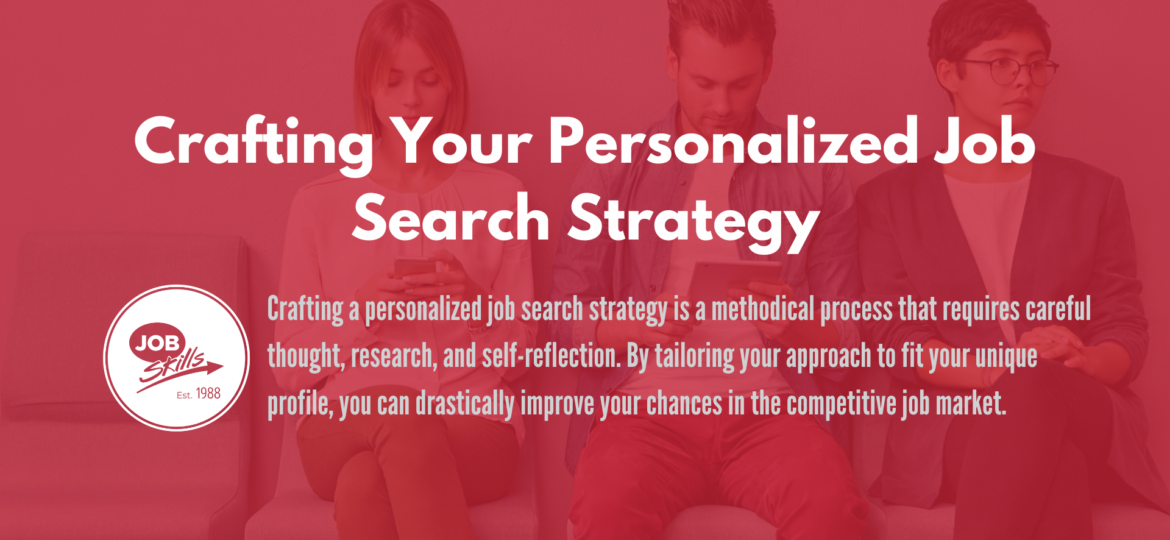
In today’s competitive job market, the banana-peel approach of blindly sending out resumes and hoping for a solid lead is as outdated as a rotary phone. Job seekers need a customized strategy, a GPS of sorts, that can effectively guide them through the labyrinth of the hiring process. This blog post is dedicated to unpacking the principles and steps involved in creating just that — your personalized job search strategy.
A personalized job search strategy is crucial for standing out in a world where recruitment is increasingly driven by algorithms and keyword optimization. It can be the difference between landing your dream job and slipping into the unnoticed stacks of a recruiter’s email inbox. Whether you’re a seasoned professional looking to make a change or a fresh graduate taking on the job market for the first time, understanding and implementing a tailored approach can be the catalyst for success.
Understanding the Importance of a Personalized Strategy
A cookie-cutter approach to job searching presents several pitfalls. First and foremost, it often results in applications that appear generic, diminishing your chance of making a meaningful connection with a potential employer. A personalized strategy, on the other hand, allows you to showcase who you are and what sets you apart from the crowd.
In this section, we’ll elucidate why personalization is more than just a buzzword — it’s a necessity. We’ll cover the nuanced benefits of tailoring your approach, such as demonstrating your genuine interest in a company, highlighting your specific skill sets, and ultimately increasing your chances of a favorable response.
Step 1: Self-Assessment and Goal Setting
Before launching into the job market, it’s imperative to conduct a thorough self-assessment. Acknowledge your strengths and limitations, identify what you’re passionate about, and determine your non-negotiables. This introspection paves the way for setting clear and realistic job search goals.
Identifying Your Strengths and Preferences
Start by inventorying your skills. What are you exceptionally good at, and which tasks do you genuinely enjoy? Tools and methodologies for self-assessment can be invaluable here, from personality tests to skill matrixes.
Setting Realistic Job Search Goals
Your goals should be SMART:
- Specific: Clearly defined objectives increase the likelihood of meeting them.
- Measurable: Establish concrete criteria for tracking progress.
- Achievable: Ensure that your goals are within the realm of possibility.
- Relevant: Align objectives with your skill set and career interests.
- Time-bound: Set a deadline for each goal to create a sense of urgency.
Step 2: Industry and Role Identification
With your self-evaluation in hand, it’s time to align your ambitions with the real-world offerings. Research is key, and so is the art of narrowing down options to those that truly resonate with your aspirations and capabilities.
Researching Target Industries
Leverage online databases, industry reports, and even informational interviews with professionals in the field. Consider market trends, potential for growth, and cultural fit within the industry.
Selecting Target Roles
Once you’ve zeroed in on a few industries, sift through the myriad job roles available. Look for positions that align with your goals, and where your skills and competencies can add significant value.
Step 3: Creating an Action Plan
Having clear goals and industry insights is half the battle. The other half involves structuring your approach, setting timelines, and crafting a detailed action plan.
Developing a Job Search Action Plan
This should include a list of potential employers, a timeline for applying, and the sequence of networking and informational interviews. Each step should be methodically planned out, incorporating your SMART goals.
Time Management Techniques
Efficiently managing your time is crucial. Allocate specific hours of the week to your job search, and use tools like calendars and to-do lists to keep you on track. Prioritize job opportunities based on their alignment with your goals.
Step 4: Application and Follow-Up
You’ve tailored your target roles and painstakingly developed an action plan. Now, it’s about executing your strategy, which involves careful crafting of applications to stand out and strategic follow-up to stay on the radar.
Tailoring Applications to Each Job
Every resume and cover letter you send should be a love letter to the respective company, showcasing how you are the perfect fit for the role. This requires adapting your language, highlighting relevant experiences, and addressing the specific needs of the employer.
Strategic Follow-Up
A well-timed follow-up email can be the nudge your application needs to get noticed. It shows genuine interest and keeps you top-of-mind with the hiring manager. However, a fine balance must be struck to avoid coming across as pushy.
Utilizing Resources and Tools
Lastly, we’ll explore the arsenal of resources and tools available to aid in your personalized job search. From LinkedIn to industry-specific job boards, to professional networks, these platforms can serve as springboards for your strategy.
Crafting a personalized job search strategy is a methodical process that requires careful thought, research, and self-reflection. By tailoring your approach to fit your unique profile, you can drastically improve your chances in the competitive job market. Remember, persistence pays off, and with a robust strategy in place, your next career move might be closer than you think.
ABOUT JOB SKILLS
For 35 plus years, Job Skills has been delivering solutions to job seekers and moving people into sustainable, meaningful employment. Throughout their long history, Job Skills has recognized that not every job seeker is the same. There is no one size fits all employment program. That’s why the Job Skills vision is building an inclusive society where all people are ensured equitable opportunities to fulfill their career aspirations and participate fully in the community.
Job Skills’ employment specialists are there to answer any of your employment questions. Job Skills‘ staff offer solutions to all job seekers, including youth, newcomers, mature workers, persons with disabilities, and entrepreneurs. Job Skills’ knowledgeable team can help you make educated decisions, set goals, and create a strategy to help you become happier in your career. Job Skills works with local employers creating employment opportunities for Job Skills’ clients.
Thanks to government funding, Job Skills’ programs and services are free to all users. Job Skills have locations across Keswick, Stouffville, Markham, Brampton, and Mississauga. Job Skills also offers virtual services for community members unable to attend one of our offices for in-person activities.
Find your employment solution today. Visit www.jobskills.org



















